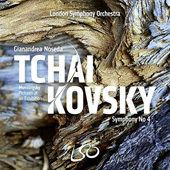
ESSENTIAL RECORDINGS

The completion in 1878 of the Symphony No. 4 in F minor, Op. 36 by Pyotr Ilyich Tchaikovsky (1840-1893) followed, and may well have been the result of a failed ill-conceived marriage, severe depression and a feeble attempted suicide (wading through a cold river in the hopes of getting pneumonia). Despite all this it was a remarkable step forward by this composer, festooned with many powerful passages exposing his highly-charged emotional character. From the deep anguish and choleric wrath in the opening movement, to the melancholy of the slow movement, the bold and innovative pizzicato techniques employed in the scherzo, and the frenzied, highly hysterical bedlam that is the final movement, it makes a powerful impression and leaves a mark.
Conductor Gianandrea Noseda and the London Symphony Orchestra players not only fully capture and project the implacable feelings of anger that set off the opening movement, but also the dichotomy of moods, from sad to heroic, that drive this dramatic motif to its impassioned conclusion. As usual the LSO strings' burnished sound reveals itself fully in the highly lyrical slow movement, and keeping in mind that this is a "live" recording, their pinpoint ensemble accuracy during the fast pizzicato segments of the following scherzo movement is to be commended. But it's in the final Allegro con fuoco movement that Tchaikovsky masterfully blends all of the above ingredients into a delectable stew that Noseda and the LSO stir to a frenzy and bring to a roaring boil.
The filler (if one can call it that) is the crowd pleasing Pictures at an Exhibition by Modest Mussorgsky. Hearing both of these pieces back to back like this reinforces the notion that even though these two Russian composers lived at the same time, they were polar opposites of each other. This performance adds an extra bit of "creepiness" to Gnomus, and the Old Castle's saxophone is a delight to the ear. You can feel the unwavering determination of the ox pulling the cart to its destination in Bydlo. And of course, the percussionists bring out the big guns at the end of the Great Gate of Kiev which brings the whole disc to a glorious finish in a flourish of brass and bells.
Jean-Yves Duperron - February 2019